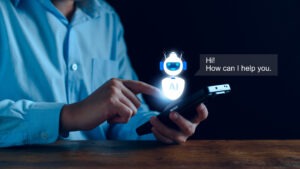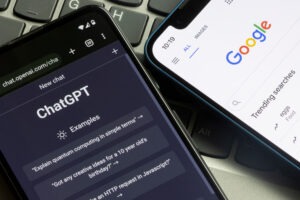ChatGPT: A Blessing or a Curse for the PR Industry?
Published on March 12, 2023, at 1:47 p.m.
by Lauren Bingham.
As technology advances, so do public relations practitioners in the way they leverage strategy and creativity to communicate with target audiences. Today, society has been thoroughly introduced to the concept of artificial intelligence, whether it be through a self-driving vehicle or asking an Amazon Alexa what the weather is like.

While AI has been a great advancement within the world of technology, it has also implanted fears of human replacement in the workplace. These robots perform jobs without the obstacles of time, money or other elements that regularly impact humans’ ability to do their work.
ChatGPT and public relations
AI’s newest and seemingly popular software, ChatGPT, has been one to stun people. No one knows what to think of such advanced technology, it seems. With its ability to write based on virtually any prompt requested, PR practitioners have found themselves pondering how ChatGPT will affect the PR professional’s career — from their perspectives on ethics to their creative abilities in performing their jobs.

This virtual assistant holds the ability to write thousand-word papers in just a matter of seconds, using upper-level vocabulary and an educational tone. While ChatGPT does hold such a fascinating ability, it has been highly discouraged to do so by educators and employers, because it produces essays lacking creativity and containing potential copyright issues. As a matter of fact, ChatGPT cannot create new pieces of work; it only knows and works from what has been previously created and uploaded to the internet.
Using ChatGPT to the practitioner’s advantage
Communications Trainer and Consultant Ken Scudder said this new software is “great for coming up with an outline.” This rings true, especially for creative blocks the PR practitioner may hit throughout their career. It is effective to take one idea and build off of it, as long as such ideas morph and change into their own form of originality. Any successful PR professional knows that some of the best pieces of writing are written by those who took established ideas and wrote about them from a completely original angle.
Scudder went on to explain what else ChatGPT could provide PR professionals. “In theory, it can automate some of the less creative parts of our jobs,” he noted, which could “allow us more time and mental energy to focus on the things we enjoy more.”

There are many arguments that this software could be best used for the mundane tasks around the office, whether it be answering certain day-to-day emails or generating ideas for a creative boost. This argument, therefore, begs the question: How much more efficient of a PR practitioner could one be when not bogged down by a dozen monotonous tasks?
Warnings from professionals
As great as a self-writing chatbot may sound, there is still so much value in hard work and originality put into the professional’s final product. Scudder said it best, explaining that “there is a difference between a tool and a crutch.” If everyone relied on ChatGPT in the same ways, the communications industry would never see a completely original piece of writing.
Chief Growth Officer Cathy McPhillips at the Marketing Artificial Intelligence Institute said, “Oftentimes ChatGPT has been known to make up facts to act as placeholders for content, but many humans are taking this at face value. Humans still need to sharpen their writing and check facts.” This claim underscores just how much more reliable a set of human eyes can be to a piece of writing, since AI cannot produce completely up-to-date information.
How does public relations advance?
As an industry, public relations has no choice but to advance alongside the latest technology. McPhillips explained that “marketers and communications pros can embrace AI, or resist it.” Practitioners must learn how to use such tools to the best of

their ability without teetering over the line of full incapacitation.
“Those who find ways to work alongside AI are going to be the ones who gain a competitive advantage,” McPhillips said. If the practitioner can explore ways to pioneer such software, they are already miles ahead in the race for industry progression.
Notably, there is a human element to a practitioner’s writing that is strongly appreciated. “You cannot replicate the human experience through ChatGPT,” Scudder said, elaborating on why it is so important to write with originality and a strong message that AI cannot replicate. “Computers have yet to do humor,” he added.
Going back to the basics
While becoming educated about ChatGPT and other software is important, it is also imperative that those both entering or already in the industry sharpen basic PR skills, such as writing and creating strong campaign messages. Artificial intelligence does

nothing for the practitioner if not build on strong foundational elements discussed previously.
It is hard to establish what may become a best practice in artificial intelligence within the public relations industry, seeing as AI software like ChatGPT is so new. Professionals are still figuring out how it integrates itself within the communicator’s code of ethics. There also is utility in sticking to the basics, as well. As AI software advances, so will business communicators, but it is crucial to never leave the value of great messaging and writing behind.




